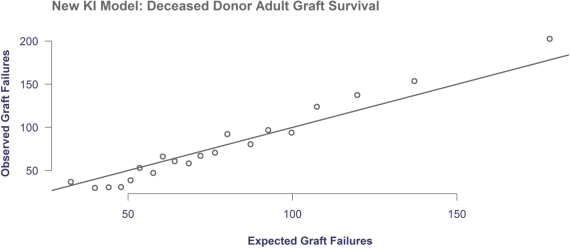New SRTR Risk-Adjustment Models for Adult Kidney Transplant Outcomes
1Scientific Registry of Transplant Recipients, Minneapolis Medical Research Foundation, Minneapolis, MN
2Johns Hopkins University, Baltimore, MD.
Meeting: 2015 American Transplant Congress
Abstract number: 62
Keywords: Kidney transplantation, Risk factors
Session Information
Session Name: Concurrent Session: Regulatory Issues in Transplant Administration
Session Type: Concurrent Session
Date: Sunday, May 3, 2015
Session Time: 2:15pm-3:45pm
 Presentation Time: 2:15pm-2:27pm
Presentation Time: 2:15pm-2:27pm
Location: Room 118-C
Following a recommendation of the Consensus Conference on Transplant Program Quality and Surveillance, SRTR implemented a 3-year rolling cycle to rebuild the statistical models used to derive expected outcomes and evaluate program performance. SRTR developed a standardized model-building process with oversight by the SRTR Technical Advisory Committee, and new models for kidney transplant recipients have been developed. Transplants performed 1/1/2011-6/30/2013 were used to develop the models. The least absolute shrinkage and selection operator (LASSO) procedure was used to determine the optimal set and form of risk predictors to include in the models such that the predictive ability of the models was optimized using 10-fold cross-validation. The discriminatory ability of the models as measured by the C statistic ranged from 0.65 to 0.76 (Table), comparable with the previous models.
| Model | C statistic |
|---|---|
| Adult, deceased donor, graft survival | 0.6576 |
| Adult, deceased donor, patient survival | 0.7136 |
| Adult, living donor, graft survival | 0.6735 |
| Adult, living donor, patient survival | 0.7599 |

To cite this abstract in AMA style:
Snyder J, Salkowski N, Zaun D, Xiong H, Leppke S, Thompson B, Segev D, Hunsicker L, Israni A, Kasiske B. New SRTR Risk-Adjustment Models for Adult Kidney Transplant Outcomes [abstract]. Am J Transplant. 2015; 15 (suppl 3). https://atcmeetingabstracts.com/abstract/new-srtr-risk-adjustment-models-for-adult-kidney-transplant-outcomes/. Accessed July 12, 2025.« Back to 2015 American Transplant Congress
